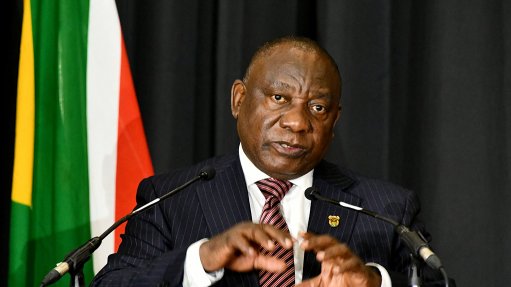
President Cyril Ramaphosa
President Cyril Ramaphosa has signed the Public Procurement Bill, which aims to create a single framework for the procurement of goods and services by all organs of State in a manner that facilitates preferential procurement and reduces the risk of corruption.
The Public Procurement Act will be administered by the Minister of Finance and applies to departments, constitutional institutions, municipalities, municipal entities, and public entities.
Among its wide-ranging provisions, the Act lists persons disallowed from submitting bids, including public office bearers, employees of Parliament or provincial legislatures, and officials or employees of public entities, constitutional institutions, municipalities and municipal entities.
In assenting to the Bill, Ramaphosa indicated that the legislation complied with Section 217 of the Constitution stipulating that goods and services be procured using a system that was “fair, equitable, transparent, competitive and cost-effective”.
Once the legislation comes into force, its preferential procurement provisions will replace stopgap rules put in place in January 2023, after the Constitutional Court determined in early 2022 that the Finance Minister had exceeded his powers by prescribing procurement rules to organs of State. This after the court found that regulations accompanying the Preferential Procurement Policy Framework Act were in contravention with Section 217 of the Constitution.
In a statement, the Presidency says the Act establishes a single framework to regulate public procurement, including preferential procurement, by all organs of State and promotes the use of technology for efficiency and effectiveness.
“The Public Procurement Act addresses weaknesses in the procurement of goods and services by organs of State that have in the past enabled various degrees of corruption, including State capture.
“The Act also responds to the acknowledgment that legislation regulating procurement by organs of State is fragmented and constrains justified advancement of persons or categories of persons who could provide goods or services.”
The law, the Presidency added, would enhance transparency and integrity to help combat corruption and facilitate the effective use of public resources, while advancing transformation and broadening economic participation.
“The Act foresees that economic development will be stimulated through the procurement of goods that are produced and services that are provided in South Africa, as well as procurement that is developmental in nature.”
Ramaphosa’s assent comes after he used his Opening of Parliament address and his reply to the debate on that speech to emphasise that the Government of National Unity would continue to prioritise the racial transformation of business while pursuing higher levels of economic growth.
“In South Africa, growth and transformation are two sides of the same coin. We cannot achieve one without the other,” he said in his reply to the debate.
The new legislation also comes as Trade, Industry and Competition Minister Parks Tau has indicated that he intends using local procurement to create early-stage demand in targeted sectors.
In his recent Budget Vote address, Tau indicated that his department would be “identifying procurement opportunities, advocating for local-content requirements, monitoring implementation and evaluating impact”.
“In identified industries, including infrastructure build programmes, we will work with relevant State-owned enterprises and industry to support local manufacturing of our key products and create jobs,” Tau said.